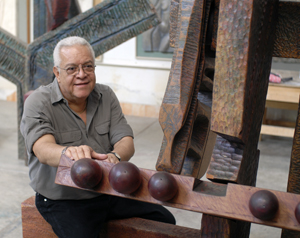As a Merrill College undergraduate, Olga Nájera-RamÃrez discovered Mexican folklórico dance and was immediately captivated. It has become a lifelong interest.
Now, the UC Santa Cruz professor of anthropology is about to premiere a documentary she wrote, directed, and produced that features one of folklórico's most acclaimed choreographers, Rafael Zamarripa. Her video production, "Danza Folklórica Escénica: El Sello ArtÃstico de Rafael Zamarripa" plays for the first time Saturday, March 6 at 7 p.m. at the Humanities Lecture Hall.
The documentary traces the development of Mexican folklórico dance through Zamarripa's experiences and artistic productions. A former member of the Ballet Folklórico de Mexico, Zamarripa is not only a master dancer and choreographer, but also a sculptor and painter. He founded the Grupo Folklórico at the Universidad de Guadalajara and the Ballet Folklórico de la Universidad de Colima. Nájera-Ramirez said his sculpture adorns numerous public buildings and plazas in Guadalajara and throughout the state of Jalisco, including "El Niño Sobre el Caballo de Mar," which has become the official symbol of the city of Puerto Vallarta.
Zamarripa will be present for the premiere and will participate in a question and answer session with Nájera-Ramirez and Russell Rodriguez, her assistant producer, musical director, and sound designer, after the showing.
Folklórico dance blossomed in the 1960s and has become a thriving phenomenon practiced in Mexico and the United States and performed all over the world.
Nájera-Ramirez, first saw Grupo Folklórico Los Mejicas perform at Merrill College in 1974 as a first-year student. Fascinated, she joined the dance troupe the next year and ended up writing an essay and putting together a slide show on Mexican dance as her senior thesis in Latin American Studies.
She remembers that as she did her research, she was shocked at the lack of literature on the topic.
While completing her senior thesis, she met Zamarripa in 1976 when he spoke at a Mexican dance conference. She was entranced by his lecture as he drew on historical and ethnographic data to explain and demonstrate the dances of Jalisco. "I knew I needed to study with him," she recalls.
She enrolled the next year in the dance program he directed at the Escuela del Artes Plásticas de la Universidad de Guadalajara. After three years, she decided to pursue graduate studies in anthropology at the University of Texas in Austin, where she specialized in folklore.
Her historical essay "Social and Political Dimensions of Folklórico Dance: The Binational Dialectic of Residual and Emergent Culture," published in 1989, is one of the first scholarly articles on folklorico dance and serves as a foundation for her documentary. Nájera-Ramirez said she first tried to persuade Zamarripa to write of his experiences because he'd been so influential. He demurred, instead suggesting that she do it.
"The more I thought about writing his story, the more I realized that words would not do justice to his artistic productions,'' she said. Eventually she suggested a film and he agreed. She launched the project five years ago and collected more than 40 hours of footage in the United States and Mexico.
She said she hopes her video documents the transitional development of folklórico, that it helps promote an appreciation for the dynamic form of cultural expression, and that it exposes more people on both sides of the border to Zamarripa's influential work.
Tickets are $6 for Danza Folklórica Escénica: El Sello ArtÃstico de Rafael Zamarripa (Mexican Folkloric Dance: Rafael Zamarripa's Artistic Trademark) and are available at the UCSC box office.
The premiere is co-sponsored by the Arts Division, Chicano/Latino Research Center. College 9 & 10, Cowell College, Crown College, Department of Anthropology, El Centro (Chicano/Latino Resource Center), Kresge College, Latin American and Latino Studies, Latino Alumni Network, Merrill College, Oakes College, Office of Campus Life & Dean of Students, Stevenson College, UCSC Alumni Association and the UCSC Diversity Office.



